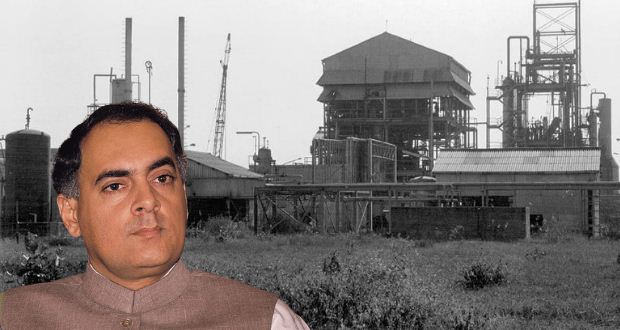37 years after the horrific intervening night of December 2-3 when thousands of innocent people, sleeping in the comfort of their homes were smothered to a painful yet quiet death- the remaining victims of the Bhopal Gas tragedy are yet to find justice. Meanwhile, the perpetrators of the horrific catastrophe continue to prance around with impulsiveness while a few are singing praises of a certain party and the legion of its supporters.
Justice is a rare commodity in India. Mostly the rich and influential tend to receive it. 37 years on since the tragedy, the lack of monetary compensation has left the victims counting days with their punctured lungs, barely breathing the increasingly noxious gases present across the country’s polluted atmosphere.
A $3 billion compensation that was reduced to $470 million, courtesy Rajiv Gandhi
Initially, India had filed a three-billion-dollar claim in the New York district court from Union Carbide Corporation (UCC) as compensation. US Secretary of State Henry Kissinger had batted to increase the compensation amount even further. JRD Tata wrote a letter to the then Prime Minister Rajiv Gandhi and presented Kissinger’s version.
However, Gandhi, for reasons unknown, chose to sit on the fence on the decision and remarked that he will consider the suggestions. Kissinger wanted an out-of-the-court settlement between the Indian government and Union Carbide. Meaning, the company was willing to increase the compensation amount, in lieu of its guilty officers getting a backdoor exit from the entire controversy.
However, with Rajiv Gandhi at the wheel, neither did the right compensation came nor the guilty parties were sent behind the bars. In the end, Union Carbide gave a measly compensation of $470 million (Rs 715 crore).
Survivors received tiny morsels while Supreme Court has not granted new dates
The survivors of the tragedy, to this day, have been battling for adequate compensation and adequate medical treatment for ailments caused by the toxic gas. The survivors claim that each victim has so far received less than one-fifth of the allotted sum.
A curative petition (civil) was filed by the Union of India on December 3, 2010, to challenge the unjust settlement of 1989 and to seek an additional sum of at least another Rs 7,724 crore as compensation.
The case was last listed before the Constitution Bench of the Supreme Court on January 29 last year with the next hearing pushed to February. However, since then, there has been no progress or allotment of new dates in the case.
Rajiv Gandhi helped Warren Anderson escape
Rather than soothing the heart and souls of the grieving public who lost their kin and breadwinners, Rajiv was more intent on helping out his cronies.
Late former External Affairs Minister Sushma Swaraj in 2015 had attributed the mysterious escape of Union Carbide chairman Warren Anderson from India to a quid-pro-quo deal brokered by Rajiv Gandhi who wanted to secure freedom of his childhood friend jailed in the USA for 35 years.
Swaraj mentioned that Rajiv was keen to secure the release of his friend’s son Adil Shahryar, who was serving 35 years in a US jail. She quoted Arjun Singh’s book, which claimed that Rajiv Gandhi had ordered him to make arrangements for Anderson’s safe passage to the US.
Courts in Bhopal had issued non-bailable warrants against Anderson twice — in 1992 and 2009. However, owing to Rajiv’s generous help, Anderson never appeared before an Indian court and died in September 2014.
Read More: How Rajiv Gandhi saved the man responsible for the Bhopal Gas Tragedy
A tragedy that could have been avoided
The Bhopal gas tragedy was preceded by multiple incidents which led to the death of several individuals and also injured many. Many news reports as far as 3 years before the major leak had warned of the impending disaster, the Government however ignoring these warnings had let union Carbide continue its operation.
Journalist Rajkumar Keswani in his series of articles “Bachaiyehuzoor is shahar ko bachaiye” (“Save Please, Save This City”), “Jwalamukhikemuhanebaitha Bhopal” (“Bhopal sitting on the brink of a volcano”), and “Na samjhoge to aakhirmit hi jaoge” (“If you don’t understand, you all shall be wiped out”) had warned of the impending disaster.
However, even after multiple red flags, warnings were ignored which led to the destruction of thousands of families and affected thousands of others in times that followed. And the sad part is that it doesn’t appear that victims of the tragedy are going to receive any justice in the near future as well.
